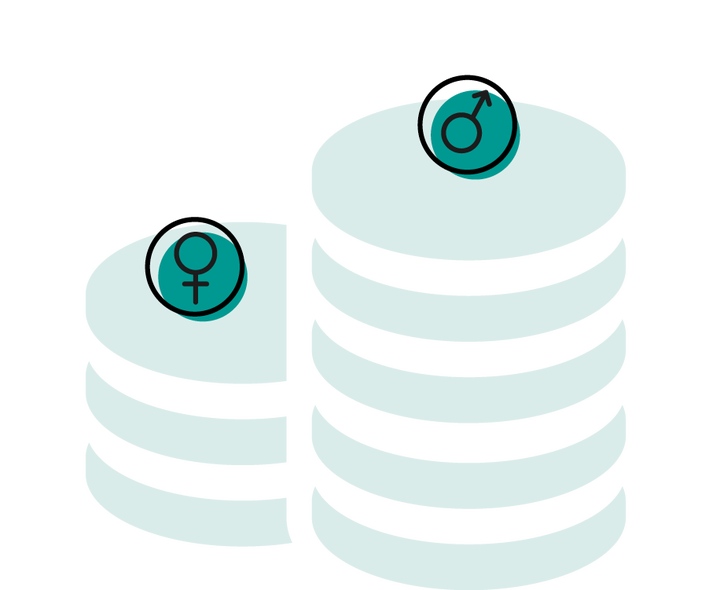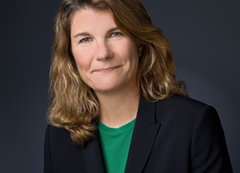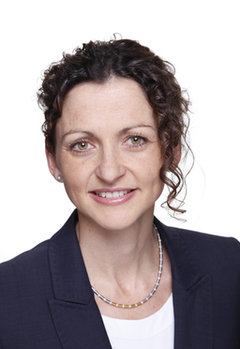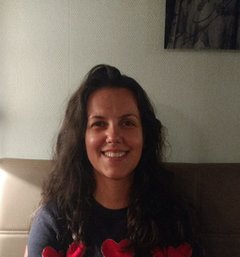with the community 2/2
Interviews
1€
84
cents





16%
Women’s gross hourly earnings are on average 16.2% lower than those of men in the EU-28
According to statistical data analysis, the gender pay gap varied from 5.2% in Romania to 25.3% in Estonia. The gender pension gap is 37.6% in the 65 and over age group, and is 10% higher in rural areas.
Despite an overall increase in women’s employment rates in the EU between 2013 and 2017, including in predominantly rural areas, important differences between EU countries remain.


Interview with Claire nusselt
Claire Nusselt is a certified German Lawyer who grew up in Mannheim, the city she came back to, to work for John Deere’s European regional office. John Deere is one of the largest employers in the region with a very good reputation. So when the company offered her a job in the Legal department in 2007 she jumped at the opportunity.
In May 2018, after having worked various jobs in the legal department, she was appointed General Counsel of John Deere GmbH & Co. KG for the region EU, northern Africa, Russia and the CIS Countries. This position allowed her to join the leadership team and also the Diversity and Inclusion Council of the region.
We asked Claire what a normal work day looked like for her
Claire leads the legal support and the compliance and data privacy processes for the region with a team that is spread out through different countries. Her day-to-day work involves lots of internal communication, coordination, monitoring, readings and knowledge sharing as she is the bridge between the senior leadership, her team and their clients.
The last months however, have been quite different tells Claire. “Because of the COVID-19, my daily work had to focus on critical emergencies while we had to telework. We learned to do all our work in a virtual fashion. Thankfully, we got all the support needed to make our numerous meetings between different time zones possible.”
Why so many men?
The Agri-food sector is a male-dominated one. We asked Claire what she thought might be the reason for this. Claire states that there are different root-causes, “One factor is that agriculture and machine production used to involve hard manual labour. Another reason is that engineering studies have attracted more male than female students in the past.” She sees the digitisation of the sector, like the use of the highly digitized machines on the farmland, as a great change that creates more equally accessible jobs for both men and women.
When asked if she thinks women have a different approach in machinery designing, Claire expresses this is not the case. She does however state some differences, “What I do notice is that women have a special skill to put strong individuals together and create harmonious teams. This observation is also shared by some of my male colleagues, who enjoy working in engineering units led by women.”
Flexibility is Key
So why are there not more women working in the industry, and what can change this we asked. Claire lets us know, “Our industry has already changed from the 1990s, but we need more flexibility. Depending on the position, I would say that women need 50 to 70 percent of working time flexibility, so that they can telework and adapt their schedule to their family needs and unplanned circumstances.” At John Deere they understand this and personnel can already work from home a part of the time.
When thinking about the current pandemic, Claire reveals something positive might come from it, “The COVID-19 crises will in my view be a game-changer, as millions of people had to work from home, and we see the possibilities. I do think that the ‘’new normal’’ as some call the post-COVID world will be more favourable to women’s careers as they will probably have more flexibility than the past generations.”
So what needs to be done to attract more women to the agri-food sector we enquired. It all comes down to communication Claire answers, “We should communicate more about the digitisation in our industry and the jobs evolving from that. This communication should be very broad and it would make a lot of sense to actively visit schools and universities and explain the new realities of the agri-food sector and its evolution towards digital technology. This would attract many female employees.” In Claire’s opinion, women in our industry can play a positive role right now by showing the younger female generation that the agricultural industry is at least as attractive as any other industry – if not more attractive.
Image building is key to attracting more women to the Agri machinery sector
We interviewed Tine Coopman, Marketing & communication Manager for AVR. A company that builds machines needed for potato cultivation. She doesn’t have an agricultural or machinery background. However, she did grow up in the countryside seeing farmers work. According to Tine it doesn’t really matter what product you do marketing & communication for; “the basic principles are the same, and the rest you will learn on the way.” In the meantime, she did really connect to the sector and its machines.
In her day-to-day work she is responsible for all communication efforts, like internal and corporate communication, product launches, media planning, event planning and social media. Tine’s goal is to keep one tone of voice over all their channels, and to carry out their key message: how will we help the farmer to generate more output with less input.
The agri-food sector is a male-dominated one. We asked Tine why according to her this is the case. “It is hard to say why the agri-food sector is a male-dominated one. Probably because of our historical and cultural background. Women used to work at home, while men went hunting, then farming or working in factories.” Tine does want to stress that a lot of women are working in the agri-food sector. “Most people work as a couple on the farm, but for some reason the men are more visible since they are out on the fields. This influences our point of view.”
So, how is the gender balance in the agricultural machinery sector?
It has been changing over time. When I started at AVR there were only five women working there, compared to 125 men (=3,8%). Six years later our team is 15 women strong compared to 165 men (=8,3%!). Now there is a woman in every department.
It is important that companies like ours put real effort in branding and image building. We have to show that working in a high-tech company is really fun and challenging, and there are more jobs than just technical ones. There is a whole variety of functions, and the extra element of working for a company that produces high level machinery, makes it only more interesting.
Do you think women have a different approach in designing agricultural machinery to men?
In some way I think women do look different at machines. If it comes to design, colours and details, women naturally have an eye for this. This can be explained by looking at our ‘prehistorical brain’ and the corresponding semiotics, which is proven by the high number of women working in sectors like interior design, graphic design and styling.
Nevertheless, I don’t underestimate a man’s sense of style 😊. We have a great R&D department, partly led by a woman, that is working on new designs for our machinery, and it is looking good.
What barriers do you see for women in the agricultural machinery sector and what do you think would break these barriers?
Not all women are open yet, to diverge their efforts to a sector/product they may have less affection with, although their capacities would be a great asset to this sector. That is why we have to show people how satisfying it is to challenge your mind by working in the machinery sector. What you don’t know, you cannot love.
What do you think organisations can do to attract more women to agricultural machinery positions?
As a company we can give the sector a more ‘female’ face in our employer branding strategy, internally and externally. We have to look for the intrinsic motivators of women: what are they looking for in a company, in a job? How can we adapt to that as a company? And how do we communicate this?
But it starts before the recruitment phase. In my opinion it is important to stimulate children and young students to choose jobs in the machinery industry. Make sure they know this is an option! An image one sees 100 times will stick in their mind and will influence their thinking and feeling about it, so image building is key!
Interview with Tine Dezeure
Tine Dezeure is a skilled Industrial Scientist, with a specialisation in electromechanics. Today she works for DEZEURE trailers – her family’s agro-machinery business. In fact, Tine is part of the third generation running this family-owned business, founded by her grandparents in 1947. After a short stint at another company to gain experience, she quickly returned to her roots and is now responsible for business process reengineering at DEZEURE. Today, she and 3 of her other family members are running the company which counts about 50 employees.
We asked Tine about the ‘journey’ to be where she is today:
I was actually born in the sector. However, my family never pushed me to choose to work in the family business. Still, during holidays and after school hours, you could often find me in the factory and I often joined my father when he went to the fields to check on the different harvesting machines. I remember being very impressed by those powerful machines. This childhood had an enormous impact on me. So that by the time I was 18 and enrolled in further education it was clear to me that I would choose something with mathematics and science. Combining that with technology felt like the only right choice for me. It looks like it was an easy decision but it really wasn’t: there are so many interesting educations - but I just followed my gut. So in 2007 I graduated as a master in industrial sciences specialized in electromechanics. I never regretted this decision.
What does a normal working day look like for you?
Today my main task is business process reengineering which is very broad: I’m working across all departments to build and guard the necessary bridges between them. I’m also responsible for HR, homologations, our construction project, implementing digital business solutions, and many more! Off course this all requires teamwork. Being part of a family business, with incredibly dedicated employees has made this easy.
As a director, I am very proud of our employees. Thanks to them we can really rely on a fantastic team of passionate people who are fully committed day after day. Thanks to their efforts, and continuous growth in demand for our products, we are now in the process of building a new (and much larger) plant.
How has it been as a woman to work in the agricultural machinery sector?
Although there were only 2 girls in a class of 80 students in my university class, I have never felt that I was disadvantaged by the fact that I am a woman. Girls should definitely not be reluctant because this is supposedly a ‘man’s world’, if they are interested in a technical degree, they should definitely go for it.
Of course I know that there are mainly men in our sector, but personally I wouldn’t describe it as being ‘male-dominated’. I had the honour to talk with several women that are working in the agri-food sector and really, all of them are extremely hard-working and motivated experts in their domain. The fact that a woman chooses to work in a ‘male-dominated world’, proves that they are really intrinsically interested in what they do and in all cases that I know, that is proven by their work output. For some reason, the perception still lives that technical jobs or sectors are less suitable for woman - but for me that’s nonsense. Everybody needs to find out what their intrinsic interests and motivations are and what their strongest competences are. If you are male or female, it makes no difference in the agricultural machinery sector as long as your motivation and skills fit the job and sector.
A woman who chooses a job as a machine designer, isn’t looking for the most obvious career path , she’s actually following her intrinsic interest. I think they prove at that point that they are persistent in succeeding in their choice. That persistence is something that I don’t see in all male candidate designers that apply to us, because for men it is often an obvious career path.
What barriers do you see for women in your sector? And how can they be overcome?
I think the biggest barrier for them is confidence. Once a woman no longer feels intimidated by the fact that she’s working in a man’s world, I really don’t see any barriers. Of course this depends on the working environment, but I strongly hope that the number of organizations that see women as inferior colleagues is very small. It would really be the companies’ own loss! In this time, in which the competition for talent is so prominent, I would strongly recommend recruiting female high potentials.
Secondly, there are still more men with a technical degree than women, so most workers in my field will still be men. The real question here is how can we attract more women to choose a technical degree. In order to improve female engagement, organizations have to be open to recruit female experts to empower their team and make sure they get the same guidance and chances to develop themselves as their male colleagues. Besides that, the organization must ensure that this attitude is supported throughout the entire company. If this is guaranteed, I’m sure women will be as engaged as their male colleagues.

Interview with Linn Warzelhan-Kato from AGCO
Vice President Human Resources Europe Middle East at AGCO, Linn Warzelhan-Kato comes from Southwest Germany and grew up in wine region Palatinate. Growing up in this region, she’s always felt related to the world of tractors, agriculture and winery. Linn has a diploma in Business & Culture Studies with focus on Asia from Passau University/Germany. The last twelve years she’s been working at AGCO in different HR Business Partner roles for Asia Pacific and Europe.
“My role is to set the HR strategy for our region in alignment with the business strategy and support the European management team in any HR related matters.”, Linn explains her job. “I manage an HR team across Europe with country and brand responsibilities and drive consistency where appropriate in compensation & benefits, talent management and HR operations.”
The agricultural machinery sector is mostly dominated by a male workforce. Linn thinks this is rooted historically. Working with heavy and technically complicated machinery is traditionally regarded as a male domain. Also, men are more often naturally attracted by this sector. “The industry overall doesn’t appear on women’s radars often. Agricultural machinery companies now deliberately focus on attracting more women. As an industry, we need to join forces reaching out to women and position ourselves. It starts by strengthening our employer branding by using compelling images that not only show machinery, but also displays our diverse workforce.”, she says. “Also, topics like sustainability, food transition and the increasing digitalisation of the agricultural machinery industry need to be promoted as they are interesting for women.”
After talking to female colleagues in product management and engineering, Linn received interesting reoccurring feedback. Female colleagues think more in interdependencies and try to understand topics holistically instead of diving into technical details. They tend to ask different questions, which have helped to put things on the table that were not considered before, or regarded as a taboo. “Female colleagues are a great asset, bringing in different perspectives in a team of experts”, Linn summarizes. “I’m sure that this difference in approach and perspective also will produce different results.”
AGCO has improved their gender representation within the leadership group by 7 percent since 2013. The focus lies on recruitment and qualified diverse candidate pools as well as internal development. The company has started organising in-house days for female students in engineering, agronomics and related subjects, offers mentoring for female students and is attending career fairs and giving guest lectures. As a result, the amount of female applicants has gone up. Internally, Diversity & Inclusion is part of AGCO’s global Strategy as well. The company has just launched a Female Development Program in manufacturing, engineering and purchasing, it offers mentoring programs and launched a training initiative on Diversity & Inclusion.

Women must dare to be active in the agricultural sector and don’t let men intimidate them
Being the daughter of 2 engineers, Kalina Hadzhieva from Bulgaria always had a fascination for mathematics and technology. She studied engineering in a country where half of the engineers are female and that employs many women in top positions. By the time she graduated, she had never felt different from any other colleague in the university – being male or female.
Kalina works as a Machinery chief Homologation engineer at a manufacturing facility in the agricultural sector. The size and complexity of the machines and the fact that the job was located at a manufacturing facility made Kalina choose her current employer. Her job is influenced by the seasonal nature of the machines she’s working with. Occasionally, Kalina travels to Brussels where she is involved in legislative work group meetings. “It’s enriching to meet colleagues from different companies, hearing their ideas and sharing experiences.” This combination creates a pleasant, dynamic workflow for her: “There is always something new to do.”
Mainly dominated by men, she thinks education and proper role models are key to break barriers and to attract more female employees in the agricultural sector. Kalina: “Prejudice from both sides is currently the biggest barrier - not only men must learn to respect women in this sector for what they are, but also women must dare to be active in the sector and don’t let arrogant men intimidate them.”
“Agricultural organisations should simply hire more women and invest in their development and career just like they invest in men.”, states Kalina. There aren’t many female engineers at her current job. None of them have ever been selected for higher management position training, but she wonders what the results would be. “Most women I know would say yes to career development opportunities, should they be offered. Generally, women don’t want special treatment, keeping in mind that this would be sexist as well. They simply want equal opportunities.”
“A solution to this challenge might be to teach children from a young age that pure female or male jobs/professions don’t exist.”, says Kalina. “Also, the government should inspire women to work full-time and encourage men to participate in raising children.” She believes that if the government works consciously in this direction, strong and inspiring female role models will appear. “A good role model isn’t necessarily a CEO. All it takes is to fight for what one wants to do. Women that are taken seriously and get equal opportunities will be the best advertisement a company and the sector can ask for. Sometimes, by doing something that appears small, you can achieve a lot.”
